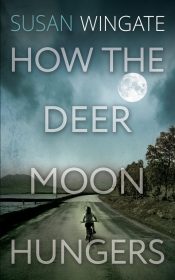By Susan Wingate
Writers face many challenges when they start a new project. Many of these challenges arise because the writer doesn’t have a clue about what she even wants to write about. Some challenges arise from structural issues?how to proceed with a story in its formatting, structure and plotting. Other concerns can include finer points like how the major action, the climax, will unfold.
For me, I don’t find writing easy but I do find it incredibly satisfying.
So, for this article, I decided to concentrate on the first page. This is where I typically start  a new story. Right about now, you might be thinking, “Well of course you start in the beginning!” But some writers do not. They will grab the climax scene or ending to begin writing and then work their way backward.
a new story. Right about now, you might be thinking, “Well of course you start in the beginning!” But some writers do not. They will grab the climax scene or ending to begin writing and then work their way backward.
I, however, begin in the beginning and I’ve listed eleven elements I think are important in writing a well-formed and interesting first page.
- This is number one on the list because I believe this item to be of the utmost importance. Your scene should begin by connecting the reader with the main character (or the protagonist).
- Next, something should be happening on the first page. This does not include a character musing about whatever. There must be action or a riveting conversation taking place to set the reader into the action.
- The scene needs to feel immediate to the reader, that the action is happening now and not in the past, even when you’re going back and forth between timelines. The yesterday scenes should feel as relevant and current as the today scenes.
- What happens in this first page action moves the story forward.
- What happens in this first scene has consequences for the protagonist further into the story.
- The protagonist has a burning desire for something. Think about these following desires:
- Forgiveness
- Vengeance
- Money
- Power
- To be accepted
- To be loved
- To be left alone
- To stop being abused
- To find happiness
- The list can go on and on but you as the writer needs to understand your protagonist to understand her desire.
- The protagonist does something to further complicate her situation. Remember, the writer must always keep in mind the protagonist’s goal and how she will attain greatest desire. Remember: There are three try-fail cycles in the novel. In the first and second try-fail cycle, the protagonist fails. In the third cycle (better known as the climax), the protagonist succeeds which then sets up the ending scenes.
- Give the reader a place and time she can see, feel, hear, taste and smell to orient the reader about where the scene is happening and how the protagonist feels about the setting.
- Backstory? What backstory? We’re in the NOW of the story. But seriously, backstory can be included as the character relates it to her situation in the now. Dialogue can include backstory and should spring naturally in the now conversations between characters.
- Try to avoid setting up your scene. You don’t need a set up. Just start it.
- What happens in this first scene should raise more questions, like what will happen next? Or, why did that happen? Or, who is this (or that) person and why are they here?
Interesting thought: a strong first-person narrative with the right content can raise powerful story questions and create page turns. Remember too, that first-person narratives set up the unreliable narrator. And they’re tons of fun to write.
11 Elements for the Best First Scenes @susanwingate #ACFWBlogs #amwriting #WritingCommunity #writerslife #Christianfiction Share on X Susan Wingate is a #1 Amazon bestselling award-winning author of over fifteen novels. Her latest novel How the Deer Moon Hungers has been nominated into the 2020 National Book Award. Susan often sets her stories in the Pacific Northwest where she lives with her husband, Bob. Visit Susan on Twitter and Facebook.
Susan Wingate is a #1 Amazon bestselling award-winning author of over fifteen novels. Her latest novel How the Deer Moon Hungers has been nominated into the 2020 National Book Award. Susan often sets her stories in the Pacific Northwest where she lives with her husband, Bob. Visit Susan on Twitter and Facebook.

Comments 2
Becky, Thank you for hosting me today on the ACFW.com blog. I appreciate it. By the way, today is my birthday. 🙂
Blessings, Susan.
I love this, Susan. It’s exactly what I discovered about the first page. I didn’t see it until this morning, so a belated Happy Birthday to you.
The quicker the action starts, the quicker you get the reader’s attention and want them to turn the page and read more. I’m going to cut, paste, and print this as a reminder to myself. Thanks again.